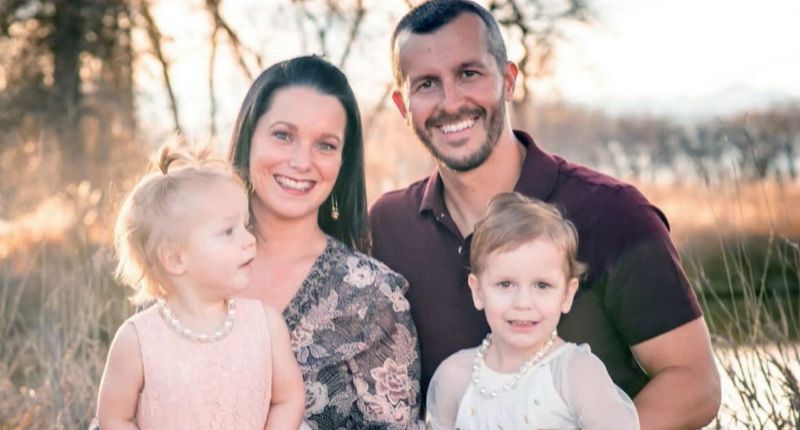On August 13, 2018, Chris Watts, a resident of Federick, Colorado, killed Shanann Watts – his wife of eight years, her unborn child Nico Watts – with whom Shanann was pregnant for 15 weeks, and his two daughters Bella and CeCe (Celeste) – aged 4 and 3 respectively. He smothered all three to death, drove to the oil fields where he worked in the wee hours, buried Shanann Watts in an unmarked grave and dropped the bodies of Bella and Celeste in two crude oil tanks through an 8” hatch.
Chris Watts returned home and assisted the police in their search for the missing pregnant wife and two children for more than two days, simultaneously giving three interviews to news channels, begging his wife to come back. It was only after the cops noticed a suspicious footage on a neighbor’s CCTV that Watts was called in for a polygraph test. He failed it, and soon confessed to killing his wife post an emotional argument about his affair with a coworker.
So, how did Chris Watts turn from a perfect husband to a violent family annihilator? What thoughts crossed his mind as he murdered his own family, only to start a new one with his mistress? How common is it for a man (yes, man – because a staggering 95% of family annihilators are males) to kill his own kith and kin in a moment of rage? More importantly, can a man like Chris Watts be lurking unnoticed around us?
Let us dig deep inside the mind of a family annihilator and understand why men kill their loved ones in a fit of rage.
Most family annihilators harbor anger, depression & resentment
Talk to any man who committed familicide – he will tell you he was bored or exhausted of the daily routine, the endless cycle of exhausting existence wore him out and eliminating the family was the only way to escape this dreary crisis.
According to numerous psychological studies, family annihilators can be placed in either of the following two categories – men who were increasingly violent and abusive towards their families leading upto the day of the murders or men who suppressed or repressed their anger, depression or resentment towards their families until they reached a psychotic break point – the point where they finally committed their crime.
In most cases, it is this anger, hatred, rage, depression or resentment that drives men to such heinous acts.
Take the Watts Family Murders for instance – Chris and Shanann Watts were most likely experiencing a financial crisis (the family had declared bankruptcy in 2015).
Chris Watts was left to care for the two children almost every weekend while Shanann went on business trips with her coworkers – this reveals some spousal discontentment within the family.
Lastly, Chris Watts started seeing his coworker while Shanann was away at her parents’ house in North Carolina for 6 weeks.
The financial crisis in the family most likely made Chris Watts feel like less of a man, an inadequate bread winner, or someone who cannot take care of his family’s needs. Resentment.
The time he spent away from Shanann and the kids further made him feel negligible and unimportant. Depression seeped in.
On the night of the murders, as Shanann threatened Chris about taking his kids away from him after discovering his affair with the coworker, the suppressed rage and anger at not getting a chance at life the way he would love to finally snapped inside Chris – leading to the shocking murders of his wife and children at his own hands.
It is very important to look at any form of discontentment within the family in a serious manner. You never know who can simply snap one day and commit drastic crimes.
Familicide often stems out of narcissism or psychopathy
Many family annihilators are either highly narcissistic or psychopaths. They cannot look beyond their own needs, they often go to any extent to get what they want, and seldom feel any remorse or guilt at their own actions.
Watch Chris Watts’ front porch interview with three Denver news channels. He pleads by looking into the camera: “I want those kids back.” and smiles. Watts display a sense of disassociation from his family by referring to his kids as those kids.
He then smirks, smiles, and lets out a small giggle at numerous points during the interview while talking about his missing family. Not only that, he goes on to talk about the shirt he’s wearing and says, “I like this shirt.”
Throughout the interview, Watts shows no emotion of concern or fear for his missing family. He also finds a way to talk about himself in the interview.
When he is finally caught by the cops post failing the polygraph test, Watts shows emotion for the first time – the helplessness of being caught. He sheds tears for himself, and when offered lunch by the investigators, Watts, rather than displaying loss of appetite over guilt, says – “Yes, I will have a pizza. I don’t care what kind.”
Narcissists have a tendency to make everything about themselves. They want the world to revolve around them. And the moment they feel they are losing control over their universe, they snap.
Psychopaths cannot feel emotions. They cannot express happiness, sorrow, guilt, regret and other range of emotions. Psychopaths cannot see beyond their own satisfaction, and if someone crosses their way the wrong way, they don’t hesitate to hurt them – not even if they are the psychopath’s own blood.
Inside the mind of a family annihilator
 Image Source : cropper.watch.aetnd.com/cdn.watch.aetnd.com
Image Source : cropper.watch.aetnd.com/cdn.watch.aetnd.com
Family annihilators are hard to detect at first sight – since many of them wear a facade most of the time. It is for this reason that reporting domestic violence is crucial – and even more crucial is reporting the incident right when it occurs. Because you never know if the sweet man-next-door is actually sweet.
It is also important to recognize signs of depression and narcissism in men early on. Seeking the right treatment on time can go a long way – especially if lives are at stake.




